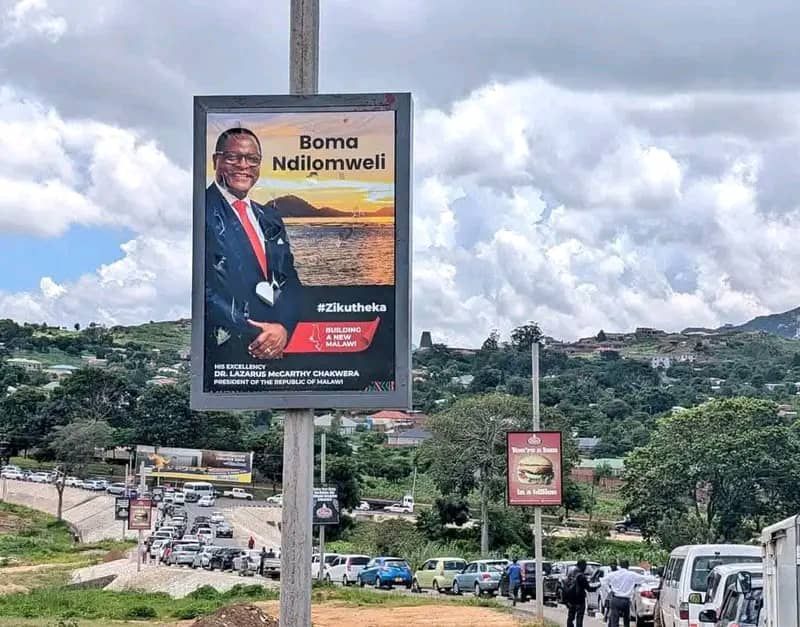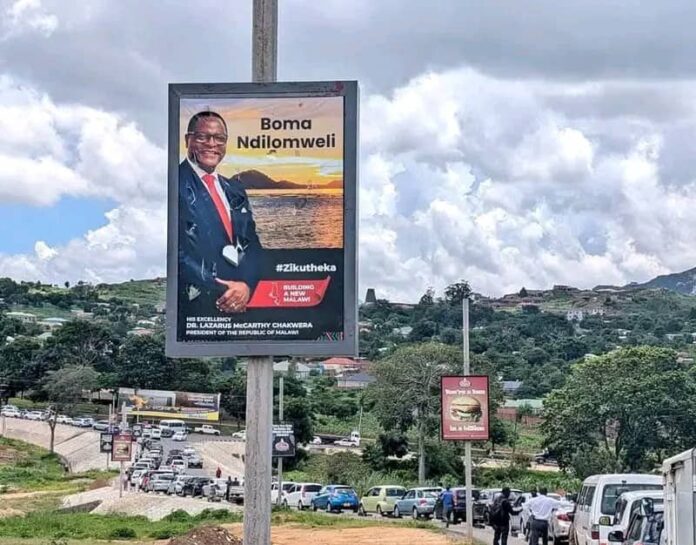By Burnett Munthali
In a stark and symbolic scene, a queue of vehicles stretches long at the Puma fuel station in Kanjedza, all waiting desperately for fuel. Amid this chaos stands a large billboard featuring the President of the Republic of Malawi. The billboard boldly declares, “Boma ndi lomweri”—a phrase loosely translating to “This is the government.”
This striking juxtaposition between the message of governance and the lived reality of citizens raises profound questions about leadership, promises, and the state of the nation.

The Puma fuel station in Kanjedza, Blantyre, has become a microcosm of Malawi’s broader struggles. On one side, frustrated drivers sit in their cars for hours, hoping to purchase fuel, a commodity that has become increasingly scarce in recent months. On the other side, the towering billboard sends a message of confidence and assurance from the government.
The irony is inescapable. For those waiting in line, the bold proclamation seems disconnected from the reality they face. The phrase “Boma ndi lomweri” now serves as a bitter reminder of unfulfilled promises and the challenges that ordinary Malawians endure daily.
Fuel shortages have plagued Malawi for months, causing widespread disruptions to businesses, schools, and daily life. The crisis has been attributed to a range of factors, including:
The country’s inability to secure sufficient foreign currency has hampered the importation of essential commodities, including fuel.
Critics argue that the government has failed to implement sustainable solutions to address the crisis, relying instead on temporary measures.
Rising fuel prices on the international market and regional supply chain disruptions have compounded the issue.
For citizens, however, these explanations offer little comfort as they grapple with the immediate consequences of a stalled economy and the rising cost of living.
The billboard at Kanjedza symbolizes the gap between political rhetoric and the lived experiences of the people. The phrase “Boma ndi lomweri” was intended as a message of stability, a reassurance that the current administration is in control and committed to delivering on its promises.
Yet, for many, it now feels like a hollow slogan. The fuel crisis, coupled with other pressing issues such as unemployment, corruption, and failing public services, has left citizens questioning the government’s ability to lead effectively.
The public response to the scene at Kanjedza has been a mix of frustration, satire, and reflection:
Many have expressed anger at the government for its perceived failure to address the fuel crisis and other economic challenges.
Social media platforms are awash with posts mocking the slogan “Boma ndi lomweri,” with users pointing out the irony of its placement next to a queue of fuel-starved vehicles.
Some citizens see the juxtaposition as a moment to reflect on the state of governance and the need for more accountability from leaders.
The scene at Kanjedza is emblematic of the broader struggles facing Malawi as the nation grapples with economic, social, and political challenges. Key lessons can be drawn from this moment:
The government must address the disconnect between its rhetoric and the realities faced by citizens. Bold declarations must be matched with bold actions that deliver tangible results.
The fuel crisis underscores the need for sustainable economic reforms, including measures to stabilize foreign exchange reserves and diversify revenue streams.
Malawians are increasingly calling for transparency and accountability from their leaders. Slogans alone will not suffice; citizens want to see progress and solutions to their everyday struggles.
The image of a fuel queue beneath a government slogan is more than a coincidence—it is a powerful commentary on the state of the nation. It captures the frustration, irony, and hope of a people yearning for change.
As Malawi moves forward, leaders must take this moment as a wake-up call to align their promises with action. Only by addressing the root causes of the country’s challenges can the government reclaim the confidence of its citizens. Until then, the words “Boma ndi lomweri” will serve as a poignant reminder of the work that remains to be done.



